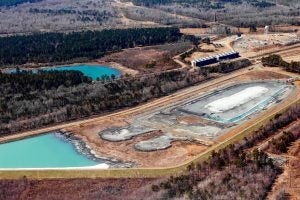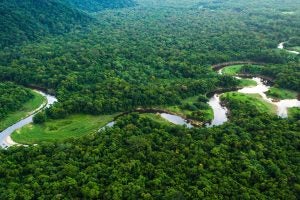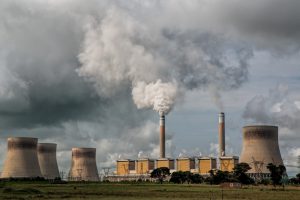 January 29, 2024
by Mary Bush
Air
International
Natural Resources
January 29, 2024
by Mary Bush
Air
International
Natural Resources
As air pollution and global warming worsens across the United States, attorneys are looking to the Atmospheric Trust Doctrine to hold states accountable for their pollution.
 November 15, 2023
by Chelsea Welch
Chemicals
Fossil Fuels
Natural Resources
Regulations
State and Local
November 15, 2023
by Chelsea Welch
Chemicals
Fossil Fuels
Natural Resources
Regulations
State and Local
Newly proposed EPA regulations targeting coal ash pollution and an expected denial of Alabama’s proposed state regulatory program show EPA’s willingness to flex its muscles in addressing the legacy of one of the country’s largest industrial waste streams.
 July 10, 2023
by Avi Wolasky
Energy
Natural Resources
Oil and Gas
July 10, 2023
by Avi Wolasky
Energy
Natural Resources
Oil and Gas
The Russian invasion of Ukraine has caused devastating turmoil. Thousands of Ukrainian civilians are dead and millions more have become refugees.[1] Civilians remaining in Ukraine lack consistent access to food, water, and other essential supplies.[2]…
 November 9, 2022
by Katya Simon
Forests
International
Natural Resources
Sustainability
November 9, 2022
by Katya Simon
Forests
International
Natural Resources
Sustainability
For decades, the Amazon rainforest has been an important natural resource in the fight against climate change due to its ability to absorb high levels of carbon dioxide from the air and act as a “carbon sink” for emissions from human activities.[1]…
 April 11, 2022
by Eleanor Green
Natural Resources
Water
April 11, 2022
by Eleanor Green
Natural Resources
Water
Spanning the border of Minnesota and Ontario is a pristine wilderness area called the Boundary Waters Canoe Wilderness, or simply the Boundary Waters. This natural area has held a place of importance for ecologists, outdoor recreationists, and native…
 April 15, 2021
by Myles Douglas Young
Litigation
Natural Resources
Public Lands
State and Local
April 15, 2021
by Myles Douglas Young
Litigation
Natural Resources
Public Lands
State and Local
The utilization of the Public Trust Doctrine in litigations is often premised on its supposed ancient Roman pedigree. This article explores the origins of the doctrine and finds that, in fact, the ancient doctrine was quite different from the one we see in the United States today. What errors do scholars make, and what do those errors mean for the survival of the modern doctrine?
By Myles Douglas Young, Administrative Editor
 March 28, 2021
by John Pullman
Endangered Species
Natural Resources
Public Lands
Wildlife
March 28, 2021
by John Pullman
Endangered Species
Natural Resources
Public Lands
Wildlife
What is it?
Biodiversity–a metric that accounts for the number of distinct species of flora and fauna on Earth–is greater now than ever before.[1] However, scientists expect that to change. Historically, there have been five mass extinction events…
 October 13, 2020
by Volodymyr Ponomarov
Energy
International
Natural Resources
Renewable Energy
October 13, 2020
by Volodymyr Ponomarov
Energy
International
Natural Resources
Renewable Energy
The European Green New Deal is an environmental plan aimed at making Europe carbon-neutral by 2050.[1] In order to achieve this ambitious goal, the European Union (“EU”) initiated the revision of a number of international agreements. Among one of those agreements is the Energy Charter Treaty (“ECT”). In July and September, 2020, the European Commission and EU Member States had two rounds of negotiations at the Energy Charter Conference dedicated to the modernization of the ECT.[2] The call for the ECT’s reform was, among other things, prompted by the ECT’s purported “serious threat to Europe’s climate neutrality target and more broadly to the implementation of the Paris Agreement.”[3]
The ECT’s modernization is important because this is the first targeted attempt to reshape the unique, legally-binding, energy-related multilateral treaty and marks a step towards compliance with the Paris Climate Accord. Additionally, modernization of the ECT provisions is relevant to U.S. companies investing in both the renewable and fossil fuel energy sectors of the ECT Member States. At this point, it is unclear how the two rounds of negotiations went and whether the actual changes are coming in the nearest future. The third round of negotiations is scheduled to take place in December 2020. This post will take a closer look at the ECT’s history, goals, and environmental standards. Furthermore, this post will address novel critiques as to its incompatibility with the Paris Climate Accord.
 May 3, 2020
by Robert Patton
Climate change
Energy
Natural Resources
Renewable Energy
May 3, 2020
by Robert Patton
Climate change
Energy
Natural Resources
Renewable Energy
The coronavirus pandemic provides a unique opportunity to address global climate change.
By Robert Patton, Managing Editor
 February 10, 2020
by Molly Green
Air
Climate change
Fossil Fuels
Natural Resources
February 10, 2020
by Molly Green
Air
Climate change
Fossil Fuels
Natural Resources
Do children have a right to a government that protects their interest in a sustainable climate? Will Courts give them a chance to voice the urgency of their climate-based claims?











